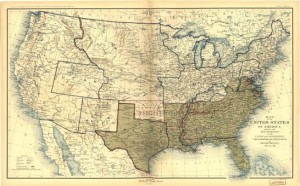 William Taylor of Pennsylvania, born April 8, 1826 and now in Company G of the 100th Pennsylvania Regiment, is soon to be promoted to Sergeant (April 15, 1863), eventually earning the rank of Captain (October 4, 1864). His service in the United States army during the war takes him to Virginia, Ohio, Kentucky, Illinois, Tennessee, Mississippi, Indiana, and Maryland. The Baptist layman is discharged from the service with a medical certificate on November 13, 1864.
William Taylor of Pennsylvania, born April 8, 1826 and now in Company G of the 100th Pennsylvania Regiment, is soon to be promoted to Sergeant (April 15, 1863), eventually earning the rank of Captain (October 4, 1864). His service in the United States army during the war takes him to Virginia, Ohio, Kentucky, Illinois, Tennessee, Mississippi, Indiana, and Maryland. The Baptist layman is discharged from the service with a medical certificate on November 13, 1864.
During his years of service, Taylor frequently writes home to his wife, Jane McKnight Taylor. Today he writes Jane from his regiment’s camp opposite Fredericksburg, Virginia. Nearly two months following the humiliating Union loss at Fredericksburg, Union forces stationed across the river from the city are preparing to break winter camp. While Taylor sometimes speaks of his religious faith in his letters, he does not do so today.
Camp Opposite Fredericksburg
February 6. 1863My dear Jane
It appears that it is very nearly the last time I shall write you from this old cabin. I begin to like it and don’t like to part with it now, after living here so long, and having handled every timber of it. It has done us good service, and kept off many a cutting wind and pelting rain. We cannot think of leaving it to be desecrated by a rebel foot, and we will at last make of it a blazing pile. We have again received marching orders, must cook three days rations, take those inevitable 60 rounds of cartridges and be ready to march at a moments notice. The word now is that we are to Embark for Fort Monroe. It is supposed that Burnside has received the command of the department of Carolina, and wants his old 9th Corps along with him. The whole thing is a guess: the only thing we know is that we are wanted to be ready at a moments notice. The weather is terrible, and fluctuates from wet to dry once or twice a day. In my last I believe I stated that it was very cold, and that it was likely some of us would freeze. So it was. Three men of the 29th Mass encamped beside us froze to death that night. It has now been raining and sleeting for 36 hours. I have been on guard for 24 hours as corporal and did not get off as unusual by standing two hours, but had to be but every two hours and post the men. The consequence is I am not in a good humor this morning, and you must pardon me if this reads a little rough. I will go to bed as soon as I write this, and perhaps after I get up will write you a better one.
Johnny has not got back yet, but will be here to night. The Col. I hear is in New Castle.
The keg has only reached Philad. yet. George writes me that the Express Company will not take it from there. If we have to leave here it is as well, as I could not get it brought away. I have written him to take the turkey out and eat it if not spoiled, and keep the other things ten days and if he does not hear further from me before then, to sell ours or do the best he can with them so that they shall not spoil. If we stop at Fort Monroe I can get it sent there, and if we don’t it will be impossible to get it at all. It is too bad after you having so much trouble with it.
We each got half a loaf of bread this morning.
Tell Sleugh that Ad. Clelans died this morning in our camp hospital.
Direct your letters as usual, to Washington, they will be sent on after us wherever we may go.
Very affectionately Yours
W Taylor
Taylor dies December 22, 1890 in Cambridge, New Jersey at the age of 64.
Sources: William Taylor letter to Jane Taylor, February 6, 1863 (link); William Taylor finding aid, College of William & Mary collection (link)


